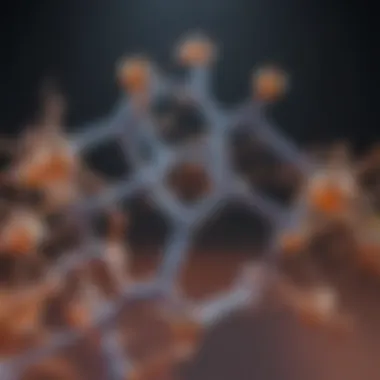THC's Impact on Prostate Cancer: Research Insights


Intro
The investigation of tetrahydrocannabinol (THC) within the domain of prostate cancer research is both timely and essential. Prostate cancer remains one of the most prevalent malignancies among men, necessitating an ongoing exploration of therapeutic avenues. Traditional treatments often carry significant side effects, leading to a demand for alternative options. THC, a major psychoactive component of cannabis, has garnered attention for its potential role in modulating cancer cell dynamics.
This article aims to dissect the nuances surrounding THC as a candidate in prostate cancer treatment. Understanding the implications of THC involves not only grasping its biochemical mechanisms but also appreciating the socio-political landscape encompassing cannabis research. As we navigate through this exploration, key findings and future directions will be highlighted to provide clarity on THC's potential impact.
Key Concepts and Terminology
Definition of Key Terms
To establish a solid foundation for this discussion, it is crucial to define some specific terms. Here are the most relevant:
- THC (Tetrahydrocannabinol): The primary psychoactive compound found in cannabis, noted for its ability to interact with cannabinoid receptors in the body.
- Prostate Cancer: A malicious growth within the prostate gland, a small walnut-shaped gland that produces seminal fluid. Its progression can lead to significant health issues if not managed properly.
- Cannabinoid Receptors: Proteins located on cell surfaces, primarily CB1 and CB2, which mediate the physiological effects of cannabinoids like THC.
Concepts Explored in the Article
The following key concepts will be explored in the detailed sections of this article:
- The pharmacodynamics of THC and its interactions with cancer cells.
- Investigations on the anti-cancer properties of THC in preclinical and clinical settings.
- Challenges in translating research findings into clinical practice.
- Potential therapeutic applications of THC in the context of prostate cancer treatment.
Findings and Discussion
Main Findings
Current studies suggest that THC may exhibit anti-cancer properties particularly in prostate cancer. Some highlight include:
- Inhibition of Proliferation: Research indicates that THC can slow down the division of prostate cancer cells. It may induce apoptosis, or programmed cell death, in these cells, a crucial factor in curbing cancer growth.
- Modulation of the Tumor Microenvironment: THC appears to influence the surrounding cellular environment, potentially enhancing the overall immune response against tumor cells.
- Synergistic Effects: Some studies propose that THC may work in conjunction with other conventional treatments, like chemotherapy, to enhance therapeutic efficacy.
Potential Areas for Future Research
Despite promising findings, the road ahead is complex. Areas that warrant further exploration include:
- Dosage and delivery methods that maximize THC's efficacy while minimizing side effects.
- Long-term effects of THC usage in prostate cancer treatment.
- Broader clinical trials to confirm efficacy and safety in diverse populations.
- Mechanistic studies to unravel how THC specifically interacts with various cancer pathways.
"The research into THC's potential reveals a fascinating dimension in prostate cancer treatment, with promising implications for future therapeutic strategies."
The future of THC in prostate cancer research is poised at a critical juncture. Further exploration is needed to bridge existing gaps, ensuring that THC could become a viable option in the therapeutic arsenal against prostate cancer.
Prelude to Prostate Cancer
Prostate cancer is a significant health concern for men, being one of the most common cancers diagnosed worldwide. Its relevance in contemporary healthcare cannot be understated, particularly when considering the advancements in research that aim to improve outcomes for patients. Understanding prostate cancer entails not just an awareness of its aggressive nature and the implications of diagnosis but also a grasp of the treatment landscape that emerges as a response to its prevalence.
Research has continually focused on various treatment modalities, highlighting the need for effective management strategies tailored to the individual patient. The role of THC, or tetrahydrocannabinol, in this space opens new avenues for exploring potential therapeutic options. When combined with a clear understanding of conventional therapies, emerging treatments, and complementary approaches, THC's potential becomes a point of considerable interest for researchers and healthcare providers alike.
Recognizing epidemiological trends also lends context to the seriousness of prostate cancer, shedding light on factors like age and prevalence in diverse populations. The insights gained from studying these trends enhance the understanding of prostate cancer’s impact and underline the importance of continuing research. By integrating factors like these into the discourse on THC and prostate cancer, one can appreciate the implications this research holds for future treatment strategies.
Ultimately, addressing prostate cancer is a multi-faceted challenge that encompasses biology, treatment effectiveness, and the exploration of innovative therapies. In a field characterized by rapid developments, the investigation of THC’s role in both the biological processes of cancer and its potential therapeutic benefits could hold significant implications for patient care and quality of life.
Understanding THC
The importance of understanding tetrahydrocannabinol, or THC, cannot be overstated in the context of prostate cancer research. THC is one of the primary active compounds found in cannabis. Its properties and actions are critical in exploring its potential therapeutic applications, particularly for conditions as complex as prostate cancer. Here, understanding THC involves its chemical structure, mechanisms of action, and the interactions within the body's endocannabinoid system.
THC's chemical composition allows for significant biological interactions. This includes its ability to bind with specific receptors that can modulate various cellular processes. In this article, we will look closer at the roles THC may have in inhibiting tumor growth, inducing apoptotic processes, and altering the cancer microenvironment. Understanding these aspects enables researchers and clinicians to better assess its viability as a treatment option.


Chemical Structure and Properties
THC has a distinct chemical structure characterized by its 21 carbon atoms, 30 hydrogen atoms, and 2 oxygen atoms. This structure allows it to interact effectively with cannabinoid receptors in the human body.
Its lipid-soluble nature gives THC the ability to pass through cell membranes easily, enabling it to bind to these receptors. Moreover, the stability and reactivity of THC produce various effects at different concentrations and in different biological contexts. The properties of THC lead researchers to investigate its potential to influence cancer pathways more deeply.
Mechanisms of Action
Interaction with Cannabinoid Receptors
The interaction of THC with cannabinoid receptors is a critical area of interest. THC primarily acts on the cannabinoid receptor type 1 (CB1) and cannabinoid receptor type 2 (CB2). The interaction with CB1 receptors, mainly found in the central nervous system, is associated with the psychoactive effects of THC. However, CB2 receptors, located primarily in the immune system and peripheral tissues, play an essential role in modulating inflammation and immune responses.
This makes the interaction with CB2 particularly relevant to cancer research. The activation of CB2 may lead to anti-proliferative effects on cancer cells, reducing tumor growth and improving the overall response to treatment.
A key characteristic of the interaction with cannabinoid receptors is its ability to inhibit the Akt/mTOR signaling pathway, which is often activated in many types of cancers, including prostate cancer. This inhibition could result in reduced cell proliferation and enhanced cell death, key mechanisms critical for mitigating cancer advancement.
Influence on Endocannabinoid System
The endocannabinoid system is an essential component of how THC affects the body. This system consists of endocannabinoids, cannabinoid receptors, and enzymes responsible for their synthesis and degradation. THC mimics endocannabinoids, leading to numerous physiological effects, including pain relief, appetite stimulation, and mood enhancement.
In relation to prostate cancer, the endocannabinoid system's modulation suggests that THC might have an impact on the tumor microenvironment. By influencing the immune response and possibly altering the inflammatory state, the endocannabinoid system could contribute to an environment less conducive to tumor growth.
A specific advantage of targeting the endocannabinoid system is its potential to enhance the effects of conventional cancer therapies. When THC is used alongside other treatments, it may help manage symptoms and improve patient comfort, bridging the gap between conventional oncology and complementary therapies.
In summary, understanding THC involves examining its chemical structure and the mechanisms by which it interacts within biological systems. The findings from these investigations are crucial for translating research into clinical practice and evaluating the potential therapeutic applications of THC in prostate cancer treatment.
THC and Cancer Biology
The exploration of THC in cancer biology is critical in understanding its overall influence on prostate cancer. Tetrahydrocannabinol, the primary psychoactive component of cannabis, shows potential as a therapeutic agent in cancer treatment. Its role is relevant as it interacts with the endocannabinoid system and affects numerous cellular processes that are pivotal in cancer pathogenesis. By studying THC's effects on cancer cells, researchers aim to identify mechanisms that could lead to innovative treatment strategies.
Effects on Cellular Proliferation
THC regulates cellular proliferation, which is a fundamental process in cancer development and progression. In numerous preclinical studies, THC has been shown to inhibit the growth of prostate cancer cells. The effects can be attributed to its interaction with cannabinoid receptors, specifically CB1 and CB2, and the modulation of pathways involved in cell cycle regulation.
Research indicates that THC can induce cell cycle arrest. This means that cancer cells are forced to halt their division, preventing tumor growth. Furthermore, it appears that THC may disrupt intracellular signaling pathways that promote proliferation, such as the MAPK/ERK pathway. In the context of prostate cancer, these findings illuminate a potentially valuable avenue for therapeutic intervention.
Induction of Apoptosis
Apoptosis, or programmed cell death, is essential in maintaining cellular homeostasis. The failure of cancer cells to undergo apoptosis contributes to tumor growth and resistance to treatment. THC has been reported to induce apoptosis in prostate cancer cells through various mechanisms. For instance, THC can activate caspases, which are enzymes that play a crucial role in the apoptotic process.
In addition, THC can increase the expression of pro-apoptotic proteins while decreasing the levels of anti-apoptotic proteins. The dual action of promoting pro-apoptotic signals while suppressing survival signals points towards THC's potential to drive cancer cells into a self-destructive path. This feature of THC underlines its significance as a possible adjunct treatment in prostate cancer, especially for patients who exhibit resistance to conventional therapies.
Inhibition of Angiogenesis
Angiogenesis, the formation of new blood vessels, is a critical process that fuels cancer growth by supplying oxygen and nutrients to tumors. THC has shown potential to inhibit angiogenesis in various cancer models. This can directly influence tumor growth and metastasis.
Research suggests that THC may reduce the expression of vascular endothelial growth factor (VEGF), a key mediator of angiogenesis. By restraining VEGF, THC can disrupt the vascular supply to tumors, thereby limiting their expansion. Understanding this mechanism could provide insights into how THC might be incorporated into treatment protocols aimed at controlling or preventing cancer progression.
In summary, investigating the biological interactions of THC and its multiple effects on cellular processes crucial for prostate cancer such as proliferation, apoptosis, and angiogenesis, opens new frontiers in oncological research. This domain deserves focused exploration, especially considering the disparities in treatment responses among prostate cancer patients.
Research Findings on THC and Prostate Cancer
Research into the effects of tetrahydrocannabinol (THC) on prostate cancer has emerged as a significant area of interest. As this research expands, it offers insights that may change the landscape of prostate cancer treatment. Understanding these findings is crucial for both researchers and practitioners. THC exhibits potential therapeutic effects that warrant extensive exploration in preclinical and clinical settings. Its interaction with cancer cells and the endocannabinoid system could lead to breakthroughs in treatment.


Preclinical Studies
Preclinical studies serve as the backbone for understanding the efficacy of THC against prostate cancer. These investigations are essential before any human trials can be contemplated. In laboratory settings, THC has shown promise in reducing cancer cell viability. These studies often employ various cancer models to explore THC's mechanisms, such as inducing apoptosis and inhibiting cellular proliferation. Research has demonstrated that THC can potentially reduce tumor size and limit metastasis.
Key characteristics of these findings include:
- Selective Action: THC shows selectivity in targeting cancer cells while sparing normal cells from harm.
- Dosing Variability: Effects can vary significantly with dosage. Understanding these nuances is vital in translating findings to clinical practice.
However, one must tread carefully. The results from preclinical studies can sometimes exaggerate potential benefits. The translatability to human subjects remains a critical question.
Clinical Trials
Clinical trials are where promises gleaned from laboratory settings are tested in real-world scenarios. These trials have shown that THC, when integrated into treatment regimens, provides several benefits.
THC in Combination Therapies
The investigation of THC as part of combination therapies has generated significant interest. This approach aims to amplify the efficacy of existing treatments while mitigating adverse effects. For example, combining THC with conventional drugs might enhance treatment outcomes for prostate cancer patients by allowing lower drug doses. This can decrease side effects while maintaining or increasing effectiveness. The unique feature of THC in this context is its ability to modulate pain perception, potentially improving patient comfort during more intensive therapies.
Advantages of combining THC with traditional treatments include:
- Enhanced Pain Relief
- Improved Tolerance to Other Medications
However, potential downsides exist. The complexity increases with multiple medications, requiring careful management and monitoring.
THC vs. Standard Care
When examining THC in comparison to standard care, researchers assess its role as either an adjunct or alternative treatment. Current evidence suggests that THC does not replace standard care but complements it. Its inclusion in treatment protocols shows evidence of reducing pain and improving quality of life in participants.
A standout feature of this comparison is the reduction in drug side effects. For many patients, THC's analgesic properties offer a means to alleviate discomfort associated with standard treatments. Potential advantages of THC include:
- Minimized Chemical Toxins
- Holistic Approach to Patient Well-Being
That said, a disadvantage is the variability in patient response, as individual tolerance and reactions to THC can differ markedly.
Overall, the research findings presented herein reflect a burgeoning interest in THC as a potential player in prostate cancer treatment strategies. As investigations transition from labs to clinical environments, conclusions drawn will need careful consideration within the context of patient care.
Potential Therapeutic Applications
The potential therapeutic applications of tetrahydrocannabinol (THC) in the context of prostate cancer are significant. By focusing on the management of symptoms and possible preventive strategies, researchers are beginning to explore how THC could complement existing treatment modalities. The exploration of THC's therapeutic use underscores its safety profile and ability to enhance patient quality of life, making it a vital topic for discussion.
Symptom Management
Palliative Care
Palliative care aims to improve the quality of life for patients facing life-threatening illnesses. One significant aspect of palliative care is its holistic approach, addressing not only the physical but also emotional and spiritual needs of patients. THC can be an effective component in managing pain and other distressing symptoms associated with prostate cancer. Its unique characteristic lies in its ability to alleviate pain without the side effects typically seen with opioids or other strong analgesics. The incorporation of THC into palliative care can provide considerable relief for patients, enhancing their overall well-being during difficult times.
Despite its benefits, there are challenges. The legal status of THC varies widely, which can limit access for many patients. While some view its use as a progressive measure in palliative care, others raise concerns about legitimacy and the need for more robust clinical guidelines.
Quality of Life Considerations
Quality of life is an essential measure when assessing any treatment's effectiveness, especially in prostate cancer. THC's potential to improve quality of life comes from its multifaceted action, such as relieving pain and reducing anxiety. This is especially important for patients who may be experiencing stress related to diagnosis and treatment regimens. By alleviating these burdens, THC can enable patients to engage more fully with their daily lives.
The unique feature of using THC to improve quality of life is its relatively low risk of side effects when used appropriately. This characteristic makes it an appealing option for many patients. However, it is crucial to consider the variability in patient responses and the potential stigma surrounding cannabis use. Some patients may be hesitant or unaware of its benefits, making education essential in expanding the therapeutic landscape of THC for prostate cancer.


Preventive Strategies
Preventive strategies using THC are still in early research phases but have potential. The hypothesis is that THC's effects on cellular processes might contribute to reducing the risk of cancer progression. Certain studies suggest that THC may play a role in preventing the proliferation of cancer cells directly. Engaging in further research is vital to understand THC's potential role in prevention comprehensively.
THC's ability to influence the endocannabinoid system shows promise in cancer prevention. By modulating cellular communication, the compound might mitigate inflammatory pathways linked to tumor development. While these theories necessitate rigorous testing, they offer an intriguing glimpse into how THC could not only be a treatment option but also a proactive measure against prostate cancer.
Limitations and Challenges
The intersection of THC and prostate cancer research presents promising avenues for therapeutic applications, yet it does not come without significant limitations and challenges. Understanding these constraints is essential because they shape the direction of future studies and influence the practical application of findings. By addressing these challenges, researchers can navigate the complex landscape of cannabis-based treatments in cancer care more effectively.
Legal and Regulatory Issues
One of the prominent concerns surrounding THC use in medicine is the varying legal status across different jurisdictions. In some regions, THC is fully legalized for medical purposes, while in others, it remains strictly prohibited. This inconsistency hampers research because obtaining approvals for clinical trials can be a lengthy and complicated process. Regulatory bodies often impose stringent guidelines related to dosage, delivery methods, and product safety. These legal barriers can slow down the pace at which discoveries translate into clinical practice.
Researchers working with THC must often deal with a mosaic of laws. These can create uncertainty over what can be studied and how. The changing landscape of cannabis legislation can also impact research funding, with grants tied to specific legal frameworks that may change.
Variability in THC Products
The variability of THC products presents another challenge in research. Cannabis plants can have different strains, each with unique properties. The difference in THC concentration, terpenes, and other cannabinoids can lead to inconsistencies in study results. Such variability makes it difficult to standardize experiments or draw precise conclusions.
There is also an issue with manufacturing practices. Some products may not contain the amounts listed on their labels, leading to difficulties in evaluating their effectiveness. Patients' experiences can also vary widely, contributing to mixed data from clinical trials. Research must account for the complexity of THC formulations, which adds an additional layer of difficulty in analyzing outcomes and efficacy.
Need for Standardized Research Protocols
The necessity for standardized research protocols is a significant topic within the scope of THC and cancer studies. Currently, there is no consensus on dosage, delivery methods, or duration of treatment, which raises questions about the reproducibility of results across different studies. Without established protocols, researchers may find their findings difficult to compare or replicate.
Establishing standardized protocols will help stabilize the research landscape, allowing scientists to focus on discovering the real therapeutic benefits of THC. Consistency in methodology not only strengthens the validity of research but also fosters collaboration among institutions. This approach could lead to the pooling of data and resources, enhancing the depth of research while mitigating some of the challenges posed by variability in products and legal restrictions.
End
Understanding the limitations and challenges surrounding THC in prostate cancer research is crucial for efficient scientific inquiry. Legal barriers, product variability, and the necessity for standardized protocols are key elements that researchers must navigate. Acknowledging these issues will allow for a clearer path forward as the scientific community works to unlock the potential of THC in cancer treatment.
Future Directions in Research
The investigation of the role of THC in prostate cancer is still in its early stages. Understanding how THC may interact with prostate cancer can open new avenues for research. Identifying specific mechanisms by which THC influences cancer cells may lead to tailored treatment protocols. This section will discuss important elements, benefits, and various considerations regarding future research endeavors in this field.
Investigating Dosage and Delivery Methods
One of the prominent areas needing attention is the dosage and delivery methods of THC. Research often varies in how THC is administered, affecting outcomes significantly. Different routes of administration such as oral, inhalation, or sublingual, can impact bioavailability and efficacy. Researchers need to establish the optimal dosages of THC that can maximize benefits while minimizing side effects. Current literature shows a range of effective doses, but consistency is lacking.
Furthermore, studies should focus on the duration of treatment and how these factors influence tumor response. For example, chronic exposure to THC might alter cellular pathways differently than acute exposure, leading to varying degrees of cancer cell death or survival. Establishing a clear understanding of these elements will be crucial.
"Effective therapeutic strategies in cancer depend on understanding the pharmacokinetics and dynamics of the agents involved. - Expert Researcher"
Understanding Synergistic Effects with Other Treatments
Another significant focus should be on understanding the synergistic effects of THC with other cancer treatments. The knowledge that THC has anti-tumor properties suggests potential for combination therapies. How THC interacts with existing treatments, like hormone therapy or chemotherapy, could lead to better strategies for prostate cancer management.
The empirical evidence indicates that combining THC with certain conventional therapies may enhance the latter's effects and reduce their side effects. This concept is key for improving patient outcomes. Research should also explore different cannabinoid profiles, assessing their combined effectiveness with THC. This will help to establish whether a multi-cannabinoid approach is beneficial compared to isolated THC use.
Ultimately, the interplay between THC and traditional treatments represents an exciting frontier in oncology research, holding promise for improved patient care and outcomes.
Closure
The conclusion of this article emphasizes the critical insights gained from exploring the role of tetrahydrocannabinol (THC) in prostate cancer research. The examination of THC extends beyond recreational use, delving into its potential as a therapeutic agent in oncology. Understanding how THC interacts with cancer biology, particularly in relation to prostate cancer, provides a nuanced perspective that could influence future treatment options.
In summary of findings, research highlights THC's multiple modes of action, including effects on cellular proliferation and apoptosis. The evidence from preclinical and clinical trials suggests that while THC has anti-cancer properties, careful consideration is needed regarding dosage and delivery methods. Furthermore, this investigation into THC underscores significant limitations, including legal challenges and product variability that could obstruct its integration into standard treatment protocols.
The implications for clinical practice are profound. As the medical community contemplates the integration of THC into prostate cancer treatment, considerations must include both patient safety and efficacy. Healthcare providers may need a comprehensive understanding of individual patient circumstances, including potential interactions with existing treatments. Additionally, the evolution of guidelines around THC may enhance its role in managing symptoms and improving quality of life in prostate cancer patients.
Overall, the research surrounding THC remains in its formative stages. Continued inquiry is essential, not only to solidify the scientific foundations but also to foster acceptance within clinical settings. The future of THC in oncological treatment is promising, provided there is a commitment to thorough and standardized research.







